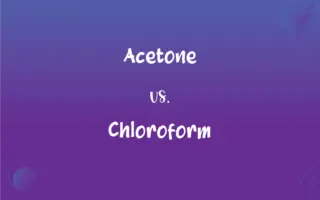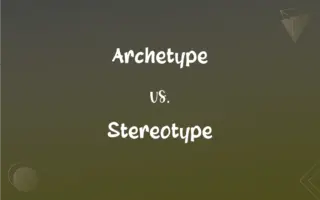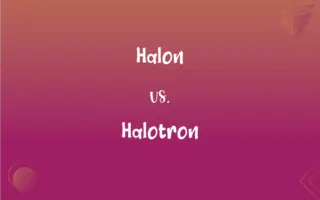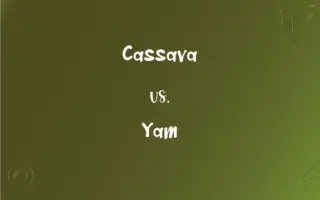Oxidation Pond vs. Oxidation Ditch: What's the Difference?
Edited by Aimie Carlson || By Harlon Moss || Published on December 22, 2023
Oxidation ponds are large, shallow basins used for wastewater treatment through natural processes, while oxidation ditches are circular or oval channels with mechanical aeration for more controlled treatment.
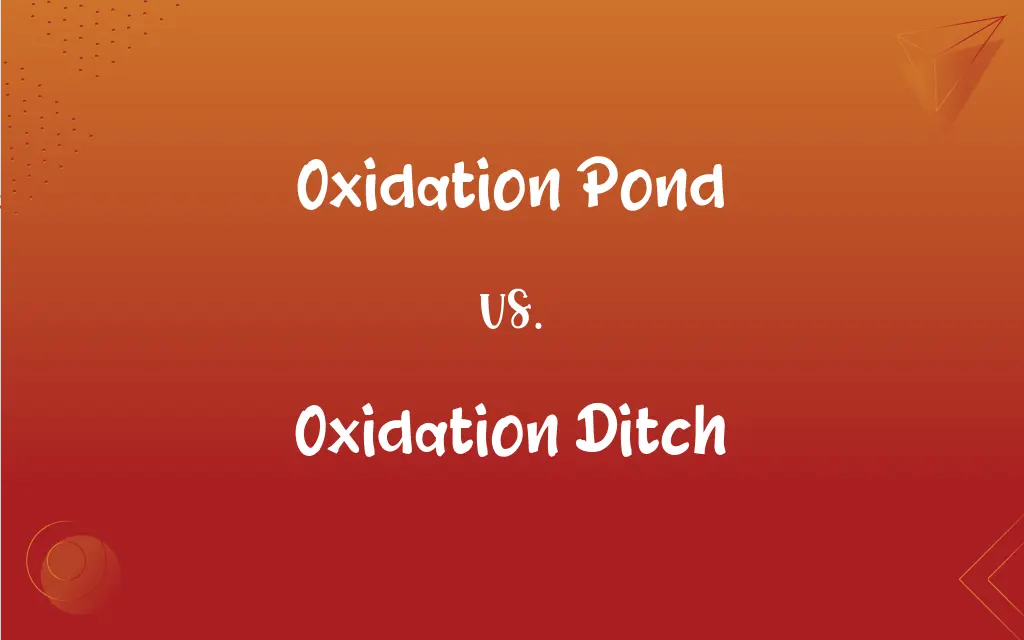
Key Differences
Oxidation ponds are large, shallow basins that rely on natural aeration through wind and algae. Whereas, oxidation ditches are engineered channels, often oval or circular, with mechanical aeration systems.
In oxidation ponds, wastewater treatment occurs through natural biological processes with sunlight, bacteria, and algae. Oxidation ditches use controlled mechanical aeration to enhance the breakdown of organic matter.
Oxidation ponds require minimal maintenance and are more cost-effective for rural areas. Oxidation ditches, being more mechanically complex, require regular maintenance and operational oversight.
Oxidation ponds are effective for basic treatment, they may be less efficient for removing all contaminants. While, oxidation ditches, with controlled aeration, provide more consistent and comprehensive treatment.
Oxidation ponds occupy larger areas, making them suitable for less densely populated regions. Oxidation ditches are more compact and thus preferable in areas where space is a constraint.
ADVERTISEMENT
Comparison Chart
Design
Large, shallow basins
Circular or oval channels with mechanical aeration
Treatment Mechanism
Natural biological processes
Mechanical aeration and controlled biological processes
Maintenance
Low, minimal operational oversight
Higher, requires regular maintenance
Efficiency
Suitable for basic treatment
More efficient in removing contaminants
Space Requirement
Requires larger areas
More compact, suitable for limited spaces
ADVERTISEMENT
Oxidation Pond and Oxidation Ditch Definitions
Oxidation Pond
An eco-friendly approach to wastewater management.
The new oxidation pond supports the town's commitment to sustainability.
Oxidation Ditch
A circular wastewater treatment system with mechanical aeration.
The new oxidation ditch uses rotors for enhanced aeration.
Oxidation Pond
A passive wastewater treatment option using natural processes.
Our oxidation pond functions efficiently with minimal intervention.
Oxidation Ditch
A compact wastewater treatment solution for urban areas.
The city's oxidation ditch efficiently handles sewage in a limited space.
Oxidation Pond
A method of biological water purification in rural areas.
Oxidation ponds are common in rural communities due to low maintenance.
Oxidation Ditch
A mechanically aided biological treatment system for sewage.
The oxidation ditch’s mechanical aerators ensure optimal waste breakdown.
Oxidation Pond
A wastewater treatment system using sunlight and algae.
Oxidation ponds rely on algae to assist in breaking down waste.
Oxidation Ditch
An engineered channel for advanced wastewater treatment.
The oxidation ditch has significantly improved our water quality.
Oxidation Pond
A large, shallow basin for treating wastewater naturally.
The oxidation pond near the village effectively treats local sewage.
Oxidation Ditch
An efficient method for removing organic contaminants from water.
Our oxidation ditch effectively manages the town's industrial wastewater.
FAQs
What is an oxidation pond?
A natural wastewater treatment system using shallow basins.
How do oxidation ponds work?
Through natural processes involving sunlight, bacteria, and algae.
Are oxidation ponds cost-effective?
Yes, especially for rural or less densely populated areas.
What is an oxidation ditch?
A circular or oval channel with mechanical aeration for wastewater treatment.
Can oxidation ponds treat all types of wastewater?
They are effective for basic treatment but may struggle with complex contaminants.
What are the maintenance requirements for oxidation ditches?
Regular maintenance and operational oversight due to mechanical components.
What is the space requirement for an oxidation pond?
They require larger areas compared to oxidation ditches.
What is the typical size of an oxidation ditch?
Size varies but is generally smaller than ponds, designed for the specific site.
What is the principle behind oxidation ditches?
Controlled biological treatment using mechanical aeration.
Are oxidation ditches suitable for small spaces?
Yes, they are more compact and ideal for limited spaces.
What are the environmental impacts of oxidation ponds?
They are generally eco-friendly but require careful management to prevent eutrophication.
How efficient are oxidation ditches?
They provide more consistent and comprehensive treatment than ponds.
What kind of maintenance do oxidation ponds need?
Minimal, mostly monitoring and occasional cleaning.
How do oxidation ditches manage odor control?
Their controlled aeration can help minimize odor issues.
Can oxidation ditches be used in residential areas?
Yes, they are suitable for urban settings due to their compact size.
Can oxidation ponds handle heavy industrial waste?
They are less suitable for heavy or toxic industrial effluents.
Is wildlife affected by oxidation ponds?
Ponds can create habitats but need monitoring to prevent negative impacts.
How does mechanical aeration in oxidation ditches work?
It uses rotors or diffusers to enhance oxygen supply and waste breakdown.
Do oxidation ponds emit odors?
Sometimes, especially if not properly maintained.
Are oxidation ditches energy-intensive?
They require more energy than ponds due to mechanical aeration systems.
About Author
Written by
Harlon MossHarlon is a seasoned quality moderator and accomplished content writer for Difference Wiki. An alumnus of the prestigious University of California, he earned his degree in Computer Science. Leveraging his academic background, Harlon brings a meticulous and informed perspective to his work, ensuring content accuracy and excellence.
Edited by
Aimie CarlsonAimie Carlson, holding a master's degree in English literature, is a fervent English language enthusiast. She lends her writing talents to Difference Wiki, a prominent website that specializes in comparisons, offering readers insightful analyses that both captivate and inform.
